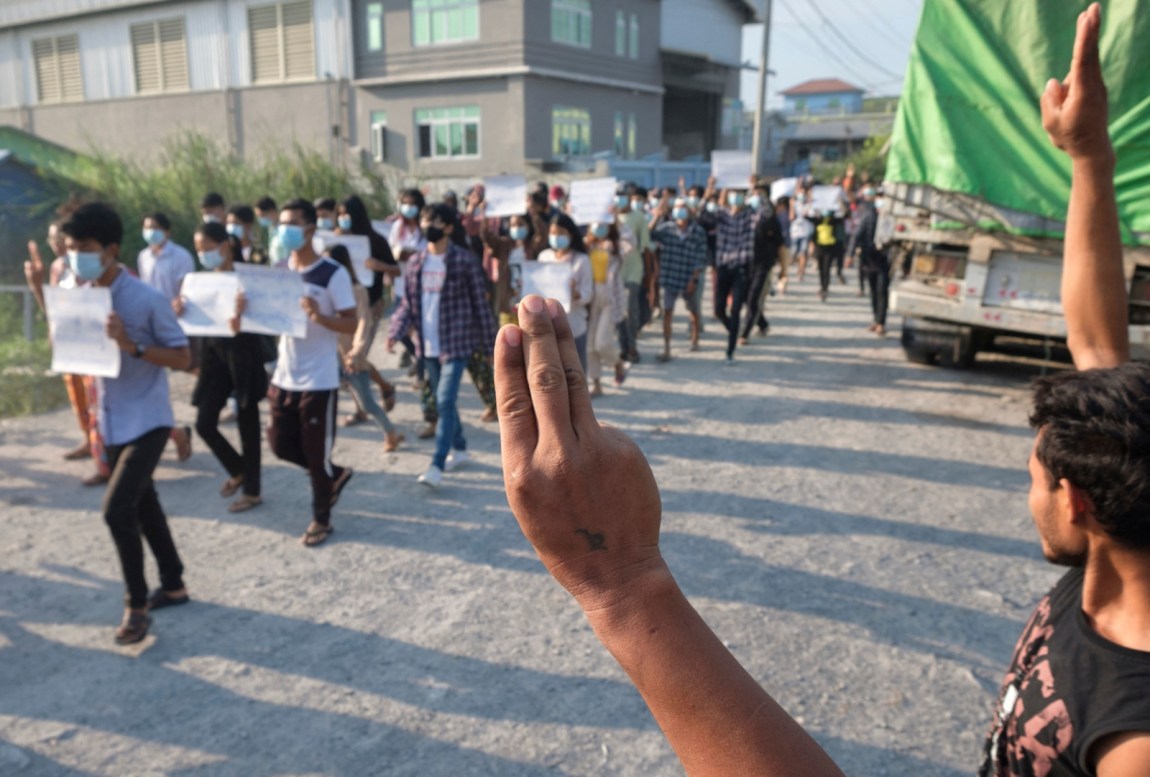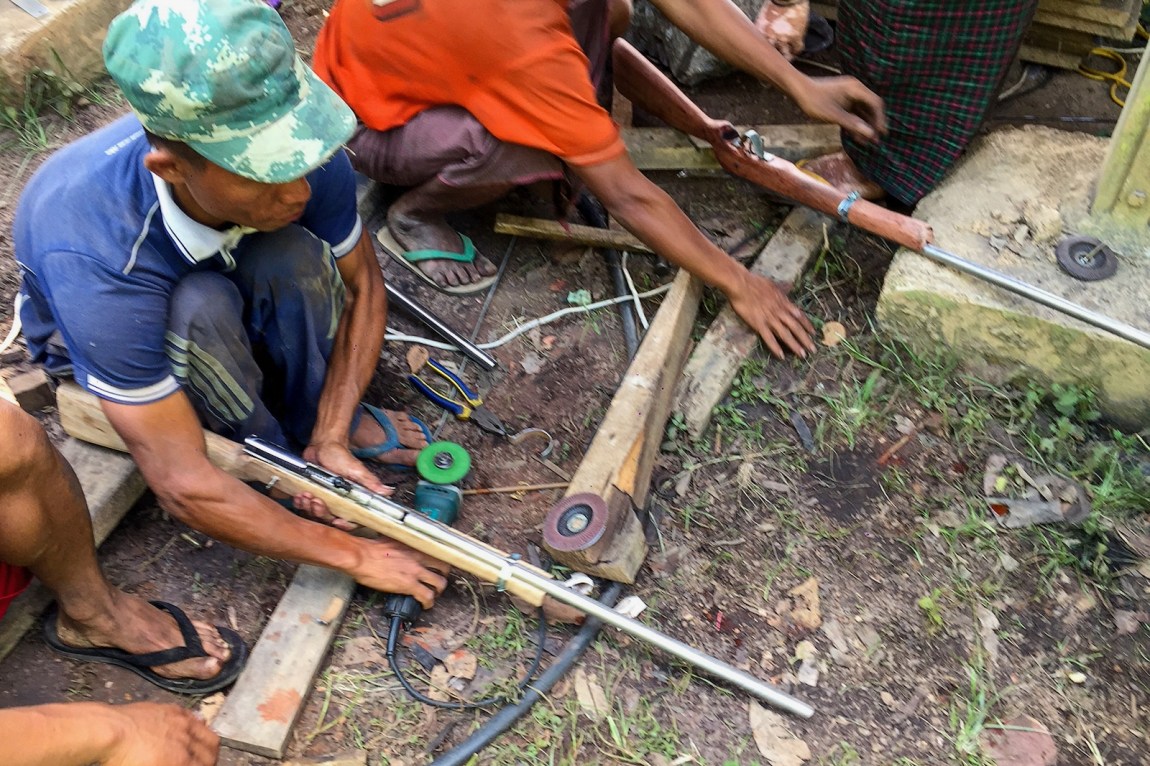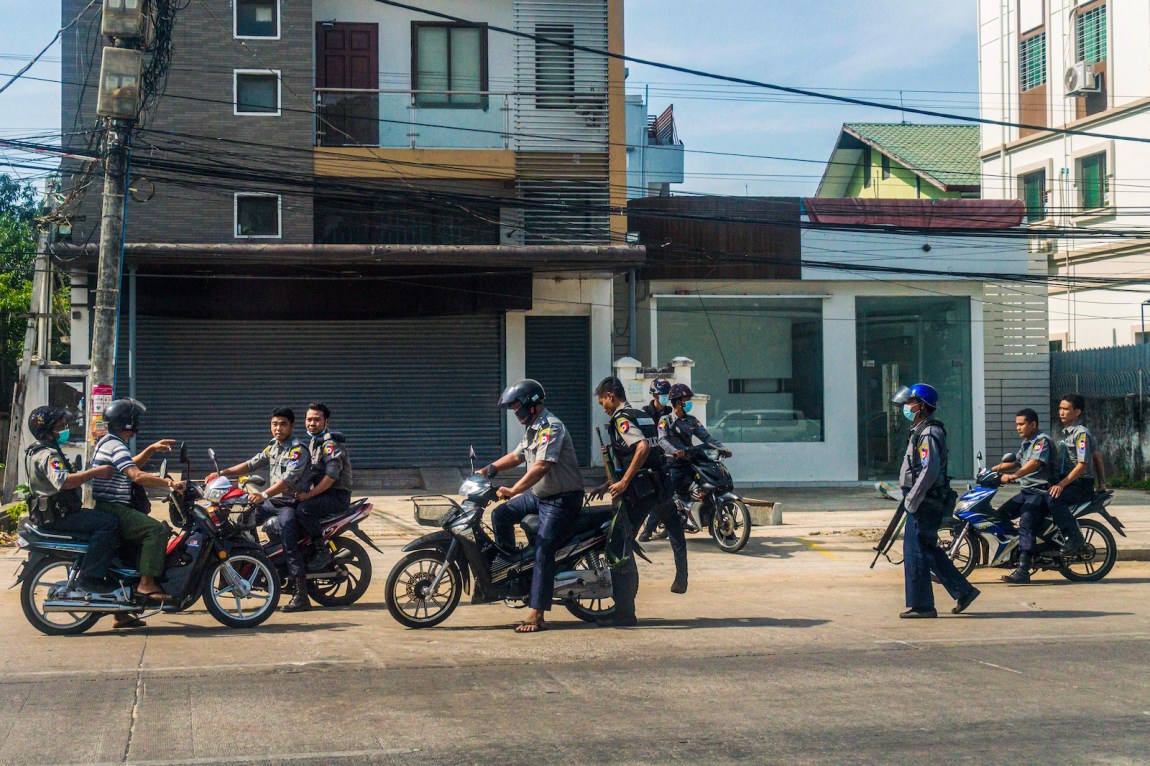Late one recent night, as agents of Myanmar’s new military junta were shattering the stillness of a formerly bustling Yangon neighborhood, a doctor hunkered down in his hideout. As soldiers smashed on doors in search of traitors, he concentrated on finishing an urgent primary healthcare plan on behalf of the parallel opposition government he recognized instead.
Four months earlier, the sixty-eight-year-old general practitioner had unhesitatingly joined hundreds of thousands of his fellow citizens in mass demonstrations against the military’s February 1 coup, which overturned a fair election and reversed a tremulous, decade-old transition from authoritarianism—the fifty years of rule by armed forces, known as the Tatmadaw, that turned the country into a giant prison. In February and March, the doctor drew on his experience as a veteran of nearly every fleeting uprising since his student days to help the trishaw drivers of his neighborhood turn their rickety vehicles into makeshift ambulances for injured protesters. He also mentored younger medics as they sought to balance honoring a strike in government services with the need to provide emergency healthcare for a rebelling populace facing both the pandemic and violent state repression, including live fire.
When the doctor and I spoke by phone last month, he told me that he sees this moment as existentially decisive: “If we fail in this revolution, we will be under military dictatorship forever.” (He requested anonymity, so that he could speak with less fear of retaliation from the regime.)
The Tatmadaw’s relentless, at times lethal, crackdown has cast a pall over the energy of those early protests. The streets have fallen mostly into a wary silence, interrupted by sporadic violence. But the repression, mass arrests, and rising death toll have yet to extinguish the potency of the opposition. Instead, it merely changed tactics.
When police and soldiers started swarming the doctor’s neighborhood, he, along with thousands of others, regrouped. Under the previous junta, he had written a regular newspaper column, in which he developed an expertise at evading the press censors by weaving in coded criticism of what he saw as the catastrophic state of national healthcare. His involvement in the pro-democracy movement now has taken a new, more critical turn, as part of an activist underground that is nurturing the shadow opposition, a government-in-internal-exile.
The doctor’s adaptability is characteristic of his country’s remarkable postcoup response. Within days of the coup, amid the chaos of fragmentary information and telecommunications blackouts, a loose array of groups coalesced to give organizational focus and momentum to spontaneous nationwide defiance. That nimble orchestration has endured, even as security forces intensify their raids, cramming the cells of the old junta’s archipelago of jails and shooting to kill with impunity. A monitoring group, the Assistance Association for Political Prisoners (Burma), has registered 4,565 arrested, charged, or sentenced, and 845 dead. The concerted pro-democracy effort has largely succeeded in thwarting the country’s self-declared new leader, commander-in-chief of the armed forces Senior General Min Aung Hlaing, from consolidating total power.
For all the Tatmadaw’s monopoly on force, it has failed to prevent a continuing mass withdrawal of labor, a sort of rolling general strike carried out under the umbrella of the Civil Disobedience Movement, as its participants quickly named it. The result is a near-paralysis of the economy and the state bureaucracy. Thousands of civil servants soon joined the doctors and other health workers who walked off the job. Teachers and transport workers, and even white-collar elites such as engineers, diplomats, and bankers, reinforced the nonviolent noncooperation action, echoing episodes from the country’s long history of resistance, from pro-independence agitators enacting boycotts against their British colonial overlords through more recent years of nonviolent pushback against military rule, guided by their leaders’ constant calls for “unity and discipline.”
Today’s collective refusal to cooperate also recalls the counsel of the late American political scientist Gene Sharp. Influenced himself by the experiences of Myanmar’s democracy activists, Sharp wrote a pithy handbook in 1994 of nonviolent resistance and political change, From Dictatorship to Democracy, at the invitation of Tin Maung Win, a Burmese exile, democrat, and journalist, who first published Sharp’s analysis in installments for a population searching for ways to move forward in the wake of an uprising and military coup in 1988. A critical weakness of even the most hardened authoritarian systems, Sharp noted, was their dependence on mass obedience and a functioning bureaucracy. Aiming precisely to deprive the new junta of these pillars of support, the strikers have persevered despite the loss of income and risk to their security.
The junta also faces the obstacle of trying to assert hegemonic authority in competition with a functional and indubitably more legitimate interim government. The Committee Representing the People’s House (CRPH) formed on February 5 in a parliamentary housing compound in Naypyidaw, the administrative capital, where soldiers had surrounded a rump group of lawmakers. Its senior leadership, including Aung San Suu Kyi, the country’s civilian head of state and longtime leading pro-democracy dissident, had all been detained incommunicado since the predawn coup four days earlier. Ignoring peremptory military orders to disperse home, fifteen of these lawmakers instead claimed the right to represent the popular mandate as elected members of parliament. Most belonged to Suu Kyi’s party, the National League for Democracy (NLD), which had won a landslide victory in the November 8, 2020, elections for the civilian seats in a civilian-military power-sharing government ushered in by the 2010 election.
Advertisement
The CRPH harks back to an earlier model, the similarly named Committee Representing the People’s Parliament, which Suu Kyi convened along with other elected lawmakers in 1998. This emerged eight years after an election that, as in 2020, had delivered a decisive victory to the then-newborn National League for Democracy—to which a previous generation of generals had likewise refused to accede. Unlike its predecessor, however, the 2021 committee has moved past performative symbolism to begin the business of governing.
The committee’s speed reflects another of Sharp’s dictums—“If the dictatorship is new, time is required for it to become well established”—by seizing the initiative amid a period of uncertainty as Min Aung Hlaing’s new junta was still configuring itself. The CRPH moved to appoint a United Nations envoy, a respected public health advocate known as Dr. Sasa, as well as a minister of foreign affairs, Zin Mar Aung, an NLD lawmaker and veteran of the pro-democracy movement, thereby ensuring that there would be no easy path to diplomatic recognition for the military coup plotters.
The CRPH also began talks with the ethnic minority political parties and the various ethnic armed groups around the country’s periphery that have for decades mounted insurgencies against the Tatmadaw, and faced its weaponized repression, amid bids for regional autonomy. With these partners, the committee has since formed a National Unity Government. Its federal democratic charter recognizes the rights to self-determination of the country’s minority states and supersedes the 2008 constitution, which the last junta filled with clauses safeguarding its unfettered hold on power. This provisional government has even attempted to form its own defense force, in part to secure control as the junta’s troops increasingly clash with defiant young people in the cities or with communities in border areas, where people have been arming themselves or building homemade explosives.
The enormity of these developments, even at this early stage, is hard to overstate. The Tatmadaw sowed division as a governing principle, meting out punishments for any person or party that dared to promote contact between members of these ethnic political organizations and the pro-democracy movement led by Suu Kyi’s NLD. When I was reporting from Yangon in 2009 and 2010, I recall that U Win Tin, a trenchant journalist and an intellectual cofounder of the NLD, yearned to reach out to the people in the country’s civil war zones once he was finally released from a nearly twenty-year prison sentence. But, denied other channels of communication, all he could do was resort to sending subtle overtures to ethnic political leaders via interviews he granted journalists from the exile press and international radio broadcasts, which everyone then relied on for news that was independent of the state propaganda apparatus. In those days, active members of the NLD and other dissidents would gather in secret and huddle around to listen to those illicit broadcasts—on Radio Free Asia or Voice of America or the BBC—often simply to learn who among them had just been arrested.
One former youth-wing member of the NLD, who came of age with that dark daily ritual, told me how rapidly the movement for democracy has evolved, with the junta’s repression acting as a catalyst. The CRPH’s leaders “are like supernatural people,” he said. “They are doing in three months what they should have done in the last five years.”
Using what Sharp once dubbed “political jiu-jitsu,” the committee has effectively turned the illegitimate force of Min Aung Hlaing’s destruction of the Tatmadaw’s own constitutional process against itself. In doing so, it has acquired its own countervailing legitimacy, vaulting over the tepid compromises previously forced on Suu Kyi and the NLD in 2012.
It was then that, after an anguished debate that bitterly divided the NLD leadership, the party accepted the few concessions offered by the military’s proxy civilian president, retired general Thein Sein, and agreed to participate in the power-sharing government by rescinding its original boycott of elections for a new parliamentary system. Yet many in the party harbored misgivings—ultimately vindicated—that the arrangement would serve less to embed democracy than to entrap Suu Kyi in a “gilded cage.” The subsequent collapse of her international reputation—from human rights icon to defender of the Tatmadaw’s murderous assaults on the Rohingya minority—coincided with domestic disappointment that her NLD was failing to represent ethnic grievances with the regime in general.
Advertisement
“The military coup has united the people of Myanmar more than ever before,” said Dr. Sasa, the UN envoy and now also the National Unity Government’s minister for international cooperation. A doctor from a remote village, Sasa had dedicated his life to educating public health and medical community workers in his native state, an impoverished and famine-ravaged region predominantly populated by the Chin ethnic minority, before entering politics last year with the NLD. On the night of the coup, he fled the capital dressed as a taxi driver, and was in hiding when the CRPH tracked him down to represent them. In response to his high-profile appeals on behalf of the committee, the new junta has charged him with treason.
“[The military] violated the constitution that they created, in which the sitting president cannot be arrested,” he told me. “The root cause of this political crisis [did] not happen yesterday.… It is their problem with democracy. They have a problem with freedom. It’s very simple.”
Even with its members forced underground, Myanmar’s parallel government is attempting to be more than just a symbolic act of defiance, unlike a largely failed predecessor, the National Coalition Government of the Union of Burma, which eventually set up headquarters in exile in Rockville, Maryland. Doctors from the Civil Disobedience Movement are working with the interim administration to use the so-called liberated areas protected by armed ethnic organizations to safely store imports of Covid-19 vaccines, keeping them out of the hands of the military. And this, too, is where the new job for the general practitioner in Yangon comes in. He now heads up the primary care arm of the Civil Disobedience Movement and interim government—one of five principal fields of healthcare designated by the unity government, which also include mass casualty events and emergency medicine.
“In 1988, we shouted slogans about human rights, about democracy, but we had no idea what that meant,” said Naing Aung, who headed one of two main rebel student organizations in that great uprising. Months of national ferment had forced the resignation of General Ne Win, who had presided over a one-party state for twenty-six years, only for a hardline junta seize power within weeks. But from the ashes of that effort, a robust political movement emerged, led by the NLD and guided by Suu Kyi and other charismatic figures. In the period of retrenchment that followed, members of the so-called ’88 Generation went on to establish a vibrant critical press abroad—with publications such as the Irrawaddy and Mizzima—as well as networks devoted to monitoring the welfare of political prisoners and to developing grassroots political education and nonviolent resistance initiatives with younger dissidents.
In 2010, I watched a clandestine group of twentysomethings, led by the son of a rural doctor who had died a political prisoner, cautiously circulate copies of the UN Declaration of Human Rights that they slipped into children’s exercise books with help from a sympathetic copyshop in downtown Yangon. On pain of years in prison, the group managed to disperse only about five hundred copies.
Pro-democracy activism was a dangerous game, sometimes played out on an almost daily basis. Naing Ngan Lin, a child of the Yangon slums who had been radicalized during the Buddhist monk–led 2007 Saffron Uprising, dodged a tail of six or seven intelligence agents as he zig-zagged across Yangon’s poorest districts to teach free lessons on civil rights and democracy. Lin later became one of the NLD’s youngest elected lawmakers in 2012, and he went on to serve as social welfare minister of Yangon region. He had no illusions, though, about the limitations imposed by the power-sharing compromise.
“We know the nature of the Tatmadaw,” he told me in 2017. Swept up in the first wave of detentions in this year’s predawn coup, Naing Ngan Lin today sits in Yangon’s Insein Prison, a notorious internment center for political prisoners.
Su Su Aung would probably have faced detention, too, if she had not been working abroad as a diplomat during the coup. Now thirty-eight, she joined the Ministry of Foreign Affairs as a clerk under the pre-2010 military government, at a time when jobs for young people from nonmilitary families were scarce. She loved the work and rose through the ranks to a posting in Washington, D.C. But the coup unraveled her. Unsure what to do, whether to serve a new junta or not, she agonized and wept all night; then, in the morning, she posted an open dissent on her Facebook page. It was one short step from that declaration to joining the Civil Disobedience Movement. Four months later, she is quietly working with the interim government from the US—through Myanmar’s UN ambassador, Kyaw Moe Tun, who was dismissed by the military after he denounced the coup on the floor of General Assembly.
Facing visa limbo, severed salaries, and imminent eviction from their government-rented apartments, she and three fellow diplomats appealed to the US State Department to maintain their diplomatic status, a move that reinforces the National Unity Government’s push for official US recognition. Thus far, the State Department is playing for time, allowing Su Su Aung and her colleagues to apply for “temporary protected status” (for which, since March, other Myanmar nationals residing the United States may be eligible, “on the basis of conditions after the coup”). According to Su Su Aung and a member of the National Unity Government, however, the State Department has also granted visas to the diplomats’ four junta-appointed replacements. Still, Su Su Aung told me, “We don’t give up.”
The Biden administration was quick to call the events of February 1 in Myanmar a military coup, a move that allows the US government to invoke legislation restricting aid to the junta. It has also imposed sanctions on individuals it holds responsible for the coup and the repression that followed. “Our goal is to end this current crisis and support the people of Burma as they work to restore their path to democracy,” said a State Department spokesperson in an e-mail.
The success of the pro-democracy movement rests now on its members’ hard-earned recognition that a struggle against authoritarianism will not achieve its ends by euphoric street protests alone, that it also demands enormous self-sacrifice and a willingness to accept short-term losses in a longer struggle. Thus far, Myanmar’s people and their provisional government have held out, against the odds. But their fragile endeavor demands a resolute response from the international community, whose leaders talk earnestly of human rights and democracy but may otherwise fall back, through inertia and pragmatism, on treating with a murderous military junta.





